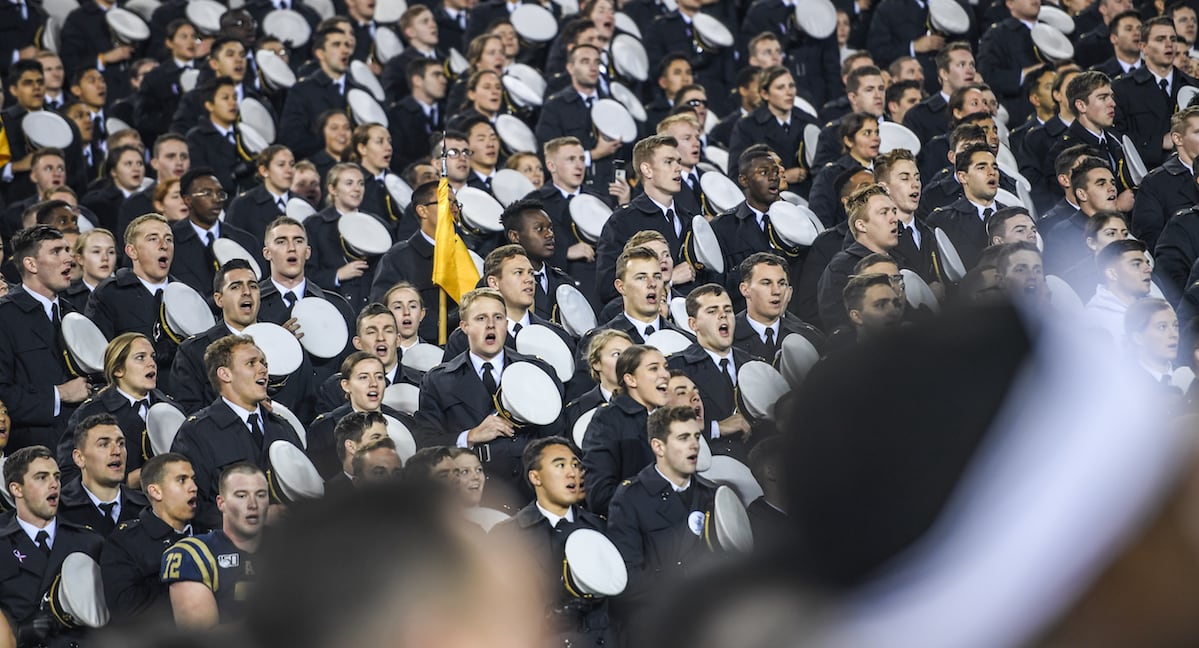The government’s top legal advocate on Monday urged Supreme Court justices to preserve affirmative action in service academies and civilian institutions alike.
Toward the end of the oral argument in what has been a controversial Supreme Court case about the legality of affirmative action, Solicitor General Elizabeth Prelogar echoed a key argument of defenders of the policy: that a diverse officer corps is necessary for national security.
“Our armed forces know from hard experience that when we do not have a diverse officer corps that is broadly reflective of the diverse fighting force, our strength and cohesion and military readiness suffer,” Prelogar said.
RELATED

The officer corps is already much less racially diverse than the enlisted ranks, and some former military leaders and legal observers have argued that ending affirmative action in higher education could widen that gap. The service academies currently practice affirmative action, as do many colleges and universities with ROTC programs.
Dozens of retired military leaders, including four former chairs of the Joint Chiefs of Staff, signed onto a legal filing in August that characterized affirmative action as necessary to national security.
Other retired leaders have disagreed, arguing in briefs and op-eds that affirmative action yields less qualified — and thus less effective — military leadership.
The case in which Prelogar spoke, Students for Fair Admissions v. University of North Carolina, concerns the university’s admissions process, which uses race as a factor in reviewing applicants.
The anti-affirmative action group Students for Fair Admissions argues that public universities violate the Constitution’s promise of equal protection when they evaluate applicants of different races. UNC has countered by saying it has a compelling interest in having a racially diverse student body.
After Students for Fair Admissions and UNC lawyers delivered arguments to the justices, Prelogar appeared on behalf of the federal government to advocate for affirmative action. In August, she and other government officials, including the Pentagon’s general counsel, filed a friend-of-the-court brief defending affirmative action.
“We have had experiences in the past where the officer corps and its racial composition did not reflect the diversity of enlisted service members,” Prelogar said Monday, in an apparent reference to internal conflict during the Vietnam War, “and it caused tremendous racial tension and strife.”
Responding to a question from Justice Elena Kagan, Prelogar said that the service academies had considered race-neutral alternatives to affirmative action. According to Prelogar, the academies found that, for now, no such alternatives would lead to an officer corps with adequate diversity.
“They’ve looked into other alternatives, like socioeconomic preferences, but West Point discovered that that would actually increase the number of white men at the academy,” Prelogar said.
Chief Justice John Roberts asked whether Prelogar wanted the court to view her argument about the military separately from arguments about civilian colleges and universities.
“Are you linking yourself to Harvard and UNC — in other words, you rise and fall with their case?” Roberts asked, later adding, “It might make sense for us not to answer the service academy issue in this case?”
Prelogar didn’t answer Roberts directly. Instead, she allowed that the military had “distinctive interests” in diversity, but stressed that the end of affirmative action in civilian colleges and universities with ROTC programs would also affect the military.
“It’s also critically important — because actually more officers come from ROTC programs — to try to protect and preserve space for universities to also achieve the educational benefits of diversity and provide the paths to leadership that inhere in those programs as well,” Prelogar said.
Courts have often granted deference to the military on matters of national security, which some legal experts argue allow service academies to seek legal leeway to continue practicing affirmative action.
Patrick Strawbridge, a lawyer for Students for Fair Admissions, rejected Prelogar’s claims that affirmative action was the only way to ensure a racially diverse set of officers.
“With respect to the military, the United States brief on that is long on assertions that race-neutral alternatives are not available to it and would not work, but not actually long on any evidence of that fact,” he said. “We don’t know precisely what race-neutral alternatives they have looked at. We don’t know what has been tried. We don’t know what else could be available to them.”
Strawbridge suggested that the military could try drawing more officers from the enlisted ranks or from military prep schools.
The oral argument in a similar case, one debating affirmative action at the private Harvard College, was held later on Monday. That case is less directly tied to the service academies than the case pertaining to UNC. Still, it could have implications for colleges and universities with ROTC programs.
Prelogar also offered input during the Harvard argument, briefly reiterating her stance on officer corps diversity.
Given the 6-3 conservative majority on the court, many legal experts expect the justices to limit or end affirmative action in higher education.
The justices almost certainly won’t decide on the affirmative action cases until months from now. The Supreme Court has often released its most contentious, high-profile cases in June.
Irene Loewenson is a staff reporter for Marine Corps Times. She joined Military Times as an editorial fellow in August 2022. She is a graduate of Williams College, where she was the editor-in-chief of the student newspaper.





